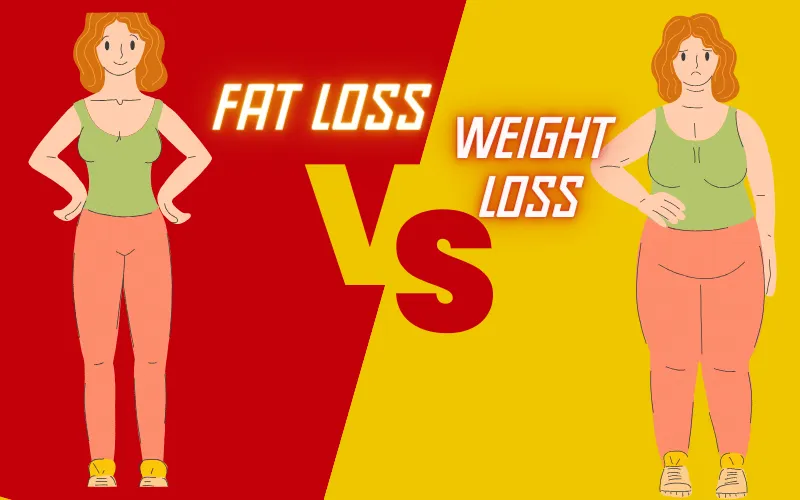Fat Loss vs Weight Loss: Understanding the Difference – 5 Essential Insights for 2024

Fat loss vs weight loss: these terms are often used interchangeably, but they signify very different paths on the journey to health. Have you ever wondered why some people seem to drop sizes but not weight? Or why your scale hasn’t moved but your clothes fit better? The distinction between fat loss and weight loss is crucial, and understanding it can transform your approach to shedding pounds.
Throughout this article, we’ll explore the nuanced differences that can help you tailor your fitness and diet plans to better suit your goals. Whether you aim to improve your physical appearance, enhance your athletic performance, or boost your overall health, grasping these concepts is the first step towards lasting change. Let’s delve into the science and strategies behind effective body composition management, debunk common myths, and uncover the truths that will empower your weight loss journey.
Table of Contents
What is Weight Loss?
Fat loss vs weight loss—understanding these concepts begins with defining what weight loss actually encompasses. When people talk about losing weight, they are referring to a decrease in their body weight, which includes muscles, fat, and fluids. This section will dissect the various components of body weight and explain how different weight loss methods affect these components.
Understanding Body Weight
Body weight is a composite measure that includes the mass of your muscles, body fat, bones, and the water content in your body. A change in any of these components can lead to a change in overall body weight. For instance, dehydration can lead to a temporary weight loss, which doesn’t reflect a true loss in body fat.
Common Causes of Weight Loss
Weight loss can occur for several reasons, some intentional and others not. Intentional weight loss often involves diets and exercise, while unintentional weight loss can be a result of health issues such as illness or stress. It’s important to identify the cause of weight loss to ensure it’s done healthily and sustainably.
Methods of Weight Loss
There are myriad ways to lose weight, ranging from dietary changes and exercise to surgical interventions. The method chosen can affect not just how much weight is lost, but what kind of weight is being shed—fat, muscle, or water. Understanding the impact of each method can help in making informed decisions about the best approach for your health and wellness goals.
What is Fat Loss?
When exploring the topic of fat loss vs weight loss, it’s crucial to understand what fat loss specifically entails. Fat loss refers to the reduction of fat stores within the body, which is often the primary goal for those looking to enhance their health and physical appearance. This section delves into the biological processes involved in fat loss and its significance for long-term health benefits.
The Science of Losing Fat
Fat loss occurs when your body breaks down fat cells for energy, a process triggered by a caloric deficit. Unlike weight loss, which can affect various components of body mass, fat loss specifically targets adipose tissue. Hormones like leptin and cortisol play significant roles in how and where fat is stored and lost, making the process complex and highly individualized.
Why Fat Loss Matters
Shedding fat, as opposed to merely losing weight, can significantly improve your health outcomes. Reducing excess body fat decreases the risk of chronic diseases such as type 2 diabetes, heart disease, and certain cancers. It also improves metabolic health, increases energy levels, and enhances overall physical function and appearance. The emphasis on fat loss over simple weight loss is essential for maintaining muscle mass and ensuring that weight lost is primarily from fat.
Fat Loss for Overall Health
Fat loss is not just about improving how you look; it’s about enhancing how your body functions at a fundamental level. By focusing on fat loss, you can ensure that the weight loss you experience is beneficial and sustainable, leading to improved longevity and quality of life. This strategic approach to body composition is vital for anyone looking to make meaningful and lasting changes to their health.
Understanding the importance of targeting fat loss specifically, within the broader context of fat loss vs weight loss, helps in crafting a more effective and healthy approach to weight management.
Comparing Fat Loss vs Weight Loss
In the journey towards better health and fitness, understanding the distinction between fat loss vs weight loss is crucial. This section will outline the key differences and implications of focusing on fat loss rather than just weight loss, helping you make more informed decisions about your health and wellness strategies.
Key Differences Between Losing Weight and Losing Fat
The primary difference between losing weight and losing fat lies in the composition of what is lost. Weight loss can involve losing water, fat, and muscle, whereas fat loss specifically targets the reduction of fat stores in the body. This focus ensures that muscle mass is preserved or even increased, which is vital for maintaining metabolic health and strength.
Health Implications of Focusing on Fat Loss
Focusing on fat loss rather than overall weight loss has significant health benefits. Reducing body fat while preserving muscle leads to a stronger, more toned body, improved metabolic rate, and better hormone balance. This approach helps prevent the yo-yo effect often associated with dieting, where weight is repeatedly lost and regained, leading to potential long-term health issues.
The Importance of Targeting Fat Loss in Weight Management
Effective weight management is about more than watching numbers on a scale—it’s about improving body composition for optimal health. Targeting fat loss can dramatically enhance the quality of the results by ensuring that the weight being lost is detrimental fat rather than essential muscle or water. This strategy not only improves appearance but also boosts functionality and health, reducing the risk of obesity-related diseases and enhancing overall well-being.
By understanding and applying the principles of fat loss vs weight loss, individuals can tailor their health strategies to focus on sustainable, healthy fat reduction, ultimately leading to more effective and long-lasting health outcomes.
How to Measure Fat Loss and Weight Loss
Understanding the difference between fat loss vs weight loss is one thing; accurately measuring them is another. This section covers the tools and techniques best suited for tracking both fat loss and weight loss, ensuring you can monitor your progress effectively and adjust your strategies as needed.
Tools and Techniques to Measure Body Fat and Body Weight
To accurately measure changes in body fat and overall weight, various tools and methods are available. Standard scales provide a basic measure of weight but do not differentiate between fat, muscle, and water. For a more detailed analysis, body fat scales, which use bioelectrical impedance analysis (BIA) to estimate body fat percentage, can be used alongside regular scales.
Understanding BMI, Body Fat Percentage, and Weight Scales
Body Mass Index (BMI) is a common measure used to categorize weight status and potential health risks but does not account for muscle mass, which can lead to inaccuracies, especially in muscular individuals. Measuring body fat percentage offers a clearer picture of body composition changes, especially when evaluating the effectiveness of your fat loss efforts. Tools like calipers, DEXA scans, or hydrostatic weighing provide more precise measurements of body fat percentage.
Importance of Regular Monitoring
Regularly tracking your weight and body fat percentage can motivate you and provide insight into what is or isn’t working in your health regimen. This monitoring is crucial for adjusting your diet and fitness plans to focus more on fat loss rather than just weight loss, ensuring that the changes you are making contribute positively to your overall health.
With these measurement tools and techniques, you can gain a comprehensive understanding of your fat loss vs weight loss journey, helping to guide your decisions and strategies effectively.
Strategies for Effective Fat Loss
To truly understand and apply the concept of fat loss vs weight loss, one must employ strategies specifically aimed at reducing body fat while preserving or even building muscle mass. This section outlines effective techniques that focus on dietary adjustments, exercise, and lifestyle changes to optimize fat loss.
Diet Adjustments for Maximizing Fat Loss
A well-planned diet is crucial for effective fat loss. Prioritizing protein intake can help preserve muscle mass during calorie deficits, while reducing carbohydrates, especially refined sugars and flours, can aid in fat reduction. Incorporating healthy fats and a variety of vegetables can also improve satiety and nutrient intake. It’s important to create a balanced caloric deficit that promotes fat loss without depriving the body of essential nutrients.
Role of Exercise in Fat Reduction
Exercise plays a critical role in effective fat loss. Cardiovascular exercises help increase the number of calories burned, aiding in fat loss. However, strength training is equally important as it builds muscle, which can boost metabolic rate and increase the calories burned at rest. Incorporating a mix of both types of exercise can yield the best results for body composition changes.
Importance of Sleep and Stress Management
Often overlooked, sleep and stress significantly impact fat loss. Lack of sleep can disrupt hormone levels that control appetite and fat storage, such as cortisol and insulin. Managing stress and ensuring adequate, quality sleep can therefore support fat loss efforts by maintaining a healthy hormonal balance conducive to losing fat rather than muscle.
By adopting these strategies, individuals focusing on fat loss vs weight loss can see more significant and sustainable results. Each element from diet to lifestyle plays a crucial role in determining how effectively the body targets fat stores for energy.
Common Myths and Misconceptions
The journey of understanding fat loss vs weight loss is often clouded by widespread myths and misconceptions. It’s essential to debunk these myths to ensure that your efforts are both effective and healthy. This section addresses some of the most common misunderstandings about fat and weight loss, providing clarity and evidence-based information.
Myth: Cutting Carbohydrates Is the Only Way to Lose Fat
One prevalent myth suggests that eliminating carbohydrates is essential for effective fat loss. While reducing carb intake can help reduce calorie consumption and thus fat, it is not the only strategy. A balanced diet that includes all macronutrients is crucial for sustainable health and can also support fat loss.
Myth: You Can Lose Fat in Specific Areas by Targeting Them with Exercises
The idea that you can target fat loss in specific body areas through exercise is another widespread misconception. While targeted exercises can strengthen and build muscle in specific areas, they do not directly burn fat from those areas. Fat reduction occurs overall, based on genetics, diet, and overall physical activity.
Myth: Supplements Can Replace Diet and Exercise for Fat Loss
Supplements are often marketed as magic solutions for weight loss, promising quick results with little effort. However, no supplement can replace the need for a healthy diet and regular exercise. Supplements should only be considered as an aid, not a substitute for these foundational elements of fat loss.
Myth: Extreme Caloric Deficits Are the Most Effective for Quick Fat Loss
Although significant caloric deficits will lead to rapid weight loss, they can often result in muscle loss and a slowed metabolism, which is counterproductive for long-term fat loss. A moderate caloric deficit that allows for gradual, sustainable fat loss is generally more effective.
Understanding these truths can help you navigate your path in the fat loss vs weight loss journey more effectively, avoiding common pitfalls and focusing on proven strategies.
Success Stories: Real-Life Examples
Exploring real-life examples can provide practical insights into the journey of fat loss vs weight loss. This section features success stories that highlight effective strategies and debunk myths, offering inspiration and lessons learned from individuals who have successfully focused on fat loss.
John’s Transformation Through Balanced Diet and Strength Training
John, a 35-year-old office worker, achieved significant fat loss by adopting a balanced diet rich in protein and vegetables and engaging in regular strength training. Over six months, John lost 20 pounds of fat while increasing his muscle mass, which not only improved his physical appearance but also enhanced his metabolic health. John’s story emphasizes the importance of a sustainable approach rather than extreme dieting.
Sarah’s Focus on Sleep and Stress Management
Sarah, a 29-year-old nurse, found that managing her sleep patterns and stress levels played a crucial role in her fat loss journey. Despite a busy schedule, prioritizing 7-8 hours of quality sleep and using meditation to manage stress helped her maintain a consistent exercise routine and healthy eating habits, leading to a 15-pound fat loss over a year. Her experience underscores the often-overlooked factors of sleep and stress in weight management.
Lessons Learned from These Success Stories
- Consistency is Key: Both John and Sarah showed that consistent, moderate changes in diet and lifestyle are more sustainable and effective for fat loss than quick fixes.
- Holistic Approach: Success in fat loss requires more than just focusing on diet and exercise; it involves managing overall lifestyle factors such as sleep and stress.
- Individualized Plans: Tailoring your fat loss plan to your unique life circumstances, preferences, and health needs is crucial for success.
These stories not only inspire but also illustrate practical applications of the principles discussed in the context of fat loss vs weight loss.
FAQs: Addressing Common Questions
As we delve deeper into the topic of fat loss vs weight loss, many readers have pertinent questions that often arise. This section aims to answer some of the most frequently asked questions, providing clear, concise, and informative responses to help guide your understanding and efforts in distinguishing and achieving true fat loss.
What’s more important for health: fat loss or weight loss?
For most people, focusing on fat loss is more important than simply reducing the number on the scale. Fat loss leads to improvements in body composition, metabolic health, and reduces the risk of many chronic diseases, whereas mere weight loss may include loss of muscle, which can actually be detrimental to your health in the long run.
Can you lose fat without losing weight?
Yes, it’s entirely possible to lose fat without seeing a change in your overall weight. This happens when you gain muscle mass at the same time as you lose fat. Muscle is denser than fat, so even if your weight remains the same, you may notice changes in your body composition and how your clothes fit.
How do diet and exercise contribute to fat loss?
Diet and exercise are both critical components of fat loss. A balanced diet helps create a calorie deficit without sacrificing nutrition, which encourages the body to burn stored fat for energy. Exercise, particularly strength training, helps preserve and build muscle mass, which increases your resting metabolic rate, further enhancing fat loss efforts.
Does fast weight loss mean more fat loss?
Fast weight loss typically does not equate to more fat loss; it often involves losing water weight and muscle mass. For sustainable fat loss, a slow and steady approach is recommended, aiming for 1-2 pounds per week. This pace helps ensure that you’re primarily losing fat and not muscle.
What role do genetics play in fat loss and weight loss?
Genetics can play a significant role in determining where you store fat and how easily you lose it. However, genetics do not doom you to a certain fate; with the right diet and exercise plan, everyone can make significant improvements in their body composition.
Is it harder to lose fat as you age?
Yes, losing fat can become more challenging as you age, primarily due to a natural decrease in muscle mass and metabolic rate. However, with adjustments to your diet and an emphasis on strength training, you can combat these effects and successfully lose fat.
In this comprehensive exploration of fat loss vs weight loss, we’ve uncovered the essential differences and impacts of each approach on your health and well-being. Understanding these distinctions is crucial for anyone looking to improve their physical health and achieve sustainable results. Fat loss, as opposed to mere weight loss, offers a more accurate and health-focused goal, emphasizing the reduction of body fat while preserving muscle mass, which is pivotal for metabolic health and overall fitness.
As we’ve discussed, effective fat loss is not solely about cutting calories but about creating a balanced approach that includes a nutritious diet, regular exercise, and adequate management of sleep and stress. It’s about making informed choices that lead to lasting changes, improving not just your appearance but your body’s functionality and health.
Remember, every journey is personal, and what works for one person might not work for another. It’s important to tailor your approach based on your individual health needs, lifestyle, and body composition. Stay informed, seek guidance when necessary, and be patient with your progress.
Armed with the knowledge from this article, you are better equipped to make the distinction between fat loss vs weight loss and choose a path that leads to healthier, more sustainable outcomes. Whether your goal is to look better, feel better, or both, focusing on fat loss will provide you with the benefits you seek.
Thank you for joining me on this detailed exploration. I encourage you to continue learning, questioning, and pursuing your health and fitness goals with renewed clarity and confidence. If you found this guide helpful, consider sharing it with others who might also benefit from understanding the crucial differences between fat loss and weight loss. Ready to take the next step in your health journey?
For more insights on achieving a healthier lifestyle, check out our other informative articles on topics such as Body Detoxification, Healthy Eating, Quick Weight Loss, and Weight Loss Diets. Dive deeper to find strategies and tips that can help you reach your wellness objectives!




